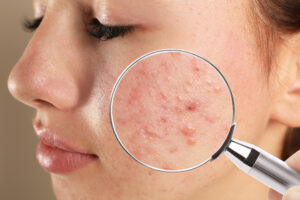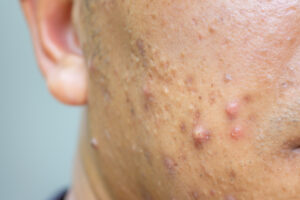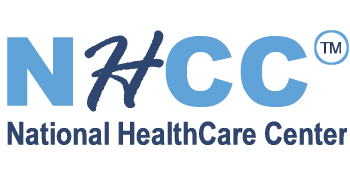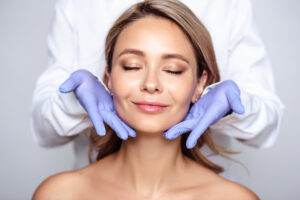
If you’re looking for Fayetteville, GA acne treatment specialists, you likely have some questions for a dermatologist about your skin. Acne can range in severity from the occasional zit or blackhead to cysts that become quite painful—and while most Americans who experience acne find that is not terribly painful, some patients do find it embarrassing. Cystic acne affects between 1-2% of the population and is considered the most severe form of acne. (For more information on cysts and cyst removal, check out our recent article on the topic!)
In this article, we will discuss the basics of acne and answer Frequently Asked Questions about the condition, including its causes, different types, treatment plans, and more. Whether you are experiencing clogged or enlarged pores or painful cysts, there are many different treatment options when it comes to acne—so you don’t have to endure the skin condition without hope of clearing it up for good. Read on for more information about Fayetteville, GA acne treatment plans!
What Causes Acne?
You may have heard that acne is caused by clogged pores—but what are your pores clogged with, exactly? In the majority of cases of acne, pimples, blackheads, and whiteheads occur when hair follicles collect dead skin cells and sebum, or the natural oil on your skin.
Acne is commonly associated with puberty and the changing of hormones, though it can affect people at any age. While we are not exactly certain what can trigger a bout of acne in any given patient given that everyone’s body chemistry and genetics are unique, what we know is that acne is typically caused by any combination of the four following factors:
- Inflammation
- Bacterial infection
- Excessive sebum production
- Clogged hair follicles with dead skin cells and oil
What Causes Cystic Acne?
Cystic acne occurs when the clogged hair follicles become infected, creating a sac within the tissue of the skin, typically filled with pus, blood, other bodily fluids, or even air. This creates pressure on the affected area which makes it sensitive to the touch and, if left untreated, can lead to scarring.
What Are the Different Kinds of Acne?
As we mentioned earlier, there are many different forms acne can take. Depending on the severity, acne can occur in the following ways:
- Blackheads, or open plugged pores
- Whiteheads, or plugged pores that are closed
- Papules, or raised red bumps that are sensitive to the touch
- Pustules, also called pimples, which are papules that include pus within them
- Nodules, or painful, solid lumps beneath the skin
- Cystic lesions, or lumps beneath the skin filled with pus, blood, or other matter that are quite painful

Where Does Acne Occur?
Acne can occur almost anywhere, though it usually appears on the face, back, chest, and shoulders. On the face, it is most commonly found in the “T zone” or the forehead, nose, mouth, and chin.
How Is Acne Treated?
There is no shortage of products marketed toward preventing acne at the average supermarket or pharmacy—however, in most cases, it’s best to have a professional dermatologist assess your condition and come up with a custom treatment plan for your needs. Acne can be treated in many ways—from topical medications which prevent hair follicles from becoming clogged to oral medications like contraceptives (for hormone control) and antibiotics.
Does Acne Treatment Work?
If you are one of the many Americans who experience some form of acne, there can sometimes be some trial and error before you find a system that works with your skin. For example, topical retinoids can make your skin more sensitive to UV light—so if you live in a sunny area, this may cause as much damage as it does control your acne. Dialing in the right form of treatment should be an ongoing conversation with your dermatologist—and in cases of severe acne, there are several treatments available, ranging from cyst excision and steroid injection to Isotretinoin.
Isotretinoin is reserved as a last resort for severe acne cases, as it can cause birth defects in babies and is associated with depression and inflammatory bowel disease. Those who take this vitamin A-derived medicine must participate in regular FDA-approved programs to manage risk, including staying on two different kinds of birth control if sexually active. Isotretinoin also makes the skin much more sensitive to sunlight; however, for all its risks and lifestyle changes, most people (nearly 90%) of acne cases who participate in this form of care see results in the form of clear or nearly completely clear skin after 16-20 weeks of treatment.
What Acne Treatment Is Safe During Pregnancy?
While Isotretinoin (or Accutane) is an effective last-ditch effort to be rid of stubborn acne, it is not safe for pregnant women. Fortunately, there are many different approaches a pregnant person might take to treat their acne—from topical medications like azelaic acid, antibiotic creams, or benzoyl peroxide to oral medications. However, typically oral medications are not a dermatologist’s first choice when treating pregnant women and are reserved for treatment-resistant acne. Oral antibiotics that are safe for treating acne in pregnant women include:
- Amoxicillin
- Cephalexin
- Erythromycin
- Azithromycin
- Cefadroxil
Does Acne Treatment Cause Dry Skin?
Most topical acne treatments can cause extra stress or sensitivity to the skin, especially benzoyl peroxide or over-the-counter products. In some cases, however, this is not always a bad thing—and some dermatologists will even recommend chemical peels as a way to reduce acne. However, in other individuals, this can backfire, triggering the skin to produce even more sebum to protect itself.
If you are using a topical treatment like benzoyl peroxide, talk with your dermatologist about the best kind of moisturizer to use, and don’t forget to incorporate sunblock into your morning routine. Remember that topical creams like benzoyl peroxide or azelaic acid are powerful, and if your dermatologist prescribes them, it’s best to take it easy on your skin. This means no violent scrubbing, harsh skincare products that may be astringent or dry out the skin, and monitoring your skin’s sensitivity to the treatment so you know when to scale back and take a day off.
Which Acne Treatment Is Best?
Because every acne patient’s circumstances are different, the best acne treatment plan is one that is collaboratively created between the patient and a local dermatologist. The best acne treatment plan will factor in environmental factors, genetics, the severity of the acne, and other conditions that may influence the efficacy (and the associated risks) of each product. If you’re interested in determining the best Fayetteville, GA acne treatment for your skin, consult a qualified dermatologist today!
Fayetteville, GA Acne Treatment
Acne can be painful and embarrassing, but it doesn’t have to take over your life. Finding the right treatment for your body can be an ongoing process, but with attention to your body’s signals, a professional dermatologist can help you find the right treatment for your condition. Acne can affect all age groups—from teenagers to pregnant people to menopausal women and beyond. While the exact triggers for a person’s acne are somewhat mysterious, the good news is, there are many different approaches an individual might take to clear up their skin—from drinking more water to prescription drugs to chemical peels, light therapy, and more.
Looking for a dermatologist to help you find the right treatment plan for your acne? Contact the National HealthCare Center today to book an appointment!


